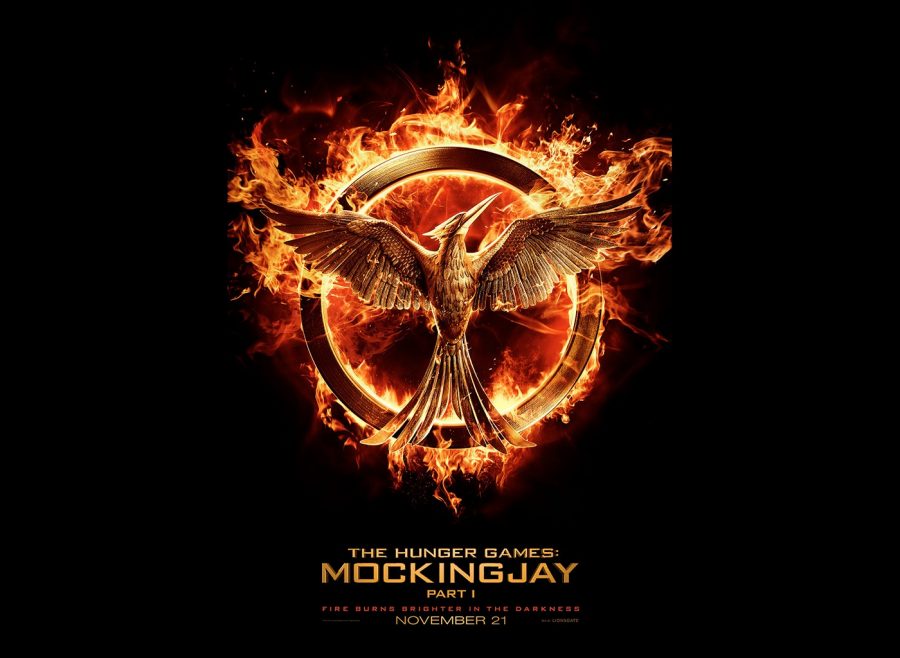By Taylor Boggs ’16, Sports Editor
Over Thanksgiving break, The Hunger Games: Mockingjay– Part 1 dominated the cinema stage remaining at number one with an estimated $56.9M in ticket sales over the weekend premiere. Despite not achieving the high sale numbers that The Hunger Games: Catching Fire did last year (Mockingjay opened 23% lower in fact), the movie achieved the third highest ticket sales during the Thanksgiving session in history (beating out Twilight and some Harry Potter movies, and only beaten by Frozen and Catching Fire).
Today, due to the many dystopia based movies, Lionsgate and other entertainment corporation companies have had to invest in series that change the typical dystopia norm. The Hunger Games series has been able to do this from the beginning—director Francis Lawrence and his cast have created an aggressive way of storytelling and have adapted the dystopian novel-based movie to appeal to the crowds of today’s day and age. The riots and heavy political disagreements have transformed into full on war with death, destruction, and despair.
Mockingjay– Part 1 completely throws out one’s expectations of the Hunger Games being the central plot of the movie. The Hunger Games, in fact, are not taking place, but a real-life game, between Peeta (Josh Hutchinson), Katniss (Jennifer Lawrence), President Coin (Julianna Moore), and President Snow (Donald Sutherland), is taking place, one in which there are higher stakes. This part of the series explores the propaganda of war and how one’s image can be just as important as one’s actions. As the face of the rebellion, Katniss must promote the rebellion while Peeta, her love interest, is trapped and tortured in the Capital.
The movie begins with Katniss rocking back-and-forth in a crazy, confused, and PTSD-induced state. As a character, she has always had trouble following the rules laid down for her. It is not until Katniss goes and sees the destruction that the Capital has caused that she is consumed by her typical fiery passion and accepts her role for the cause. Jennifer Lawrence does an excellent job of portraying a character who is supporting the cause, but still is nonetheless a piece of the Capital’s and now also District Thirteen’s games because she has no control in how they use her for the propaganda. She also cannot take any part in real action because she has to be safe and alive. In the film, not only is Katniss’s character developed more, Peeta, although Hutcherson received little screen time, got to enjoy a more interesting role than just protecting Katniss. In the same way that Katniss is the puppet for District Thirteen, he is the puppet for the Capital. Every time Hutcherson appeared on the screen, he was progressively gaunter, meeker, and more sickly-looking, implying that the Capital was doing things to his mind.
As is expected, Jennifer Lawrence is the star of the movie. However, screen time changed significantly for many of the other characters. We see much more of Gale (Liam Hemsworth) as he is often with Katniss and becomes one of the highest ranking soldiers in the rebel cause, while Peeta (Josh Hutcherson) is viewed significantly less because he is in the Capital. Likewise, due to District Thirteen’s strict rules, Haymitch (Woody Harrelson) becomes a cranky sober and Effie Trinket (Elizabeth Banks) becomes a stubborn fashion diva, stuck in gray clothes and without wigs. New characters are introduced as well, such as Katniss’s camera crew and her bodyguard Boggs.
The movie overall depicts the horrors of war and some scenes are hard to watch, let alone stomach. Lawrence and the other actors had a more emotional role in this movie than the first two combined. Even though no major action takes place, the character development throughout the film was a crucial backbone off of which the final installment can be built. Although it ended with a disturbing and heart-wrenching scene, it established an extreme emotional cliff-hanger and prepared the audience for what is to come in the last movie of the series.
Similar to the first half of the novel, the movie was slow and repetitive, however it was entertaining and showed that no matter the cause, propaganda is deceptive and manipulating. It also develops the idea of love being the driving force for extreme action and the difficulty of taking on big roles as a young and inexperienced person.






